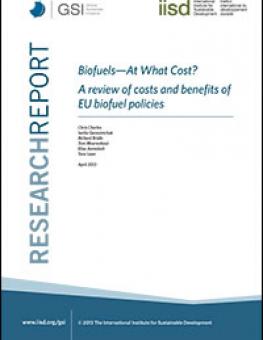
Biofuels—At What Cost? A review of costs and benefits of EU biofuel policies
Biofuels—At What Cost? A review of costs and benefits of EU biofuel policies analyzes a range of costs and benefits associated with European Union (EU) conventional biofuel policies.
The study provides a comprehensive overview of economic and non-economic costs and benefits of the EU, quantifying them where possible using estimates available from public accounts, state-of-the-art literature and author calculations. The paper identifies the main cost of the industry as subsidy schemes, which in 2011 were estimated to be EUR 9.3 - 10.7 billion. The study examines the key benefits generated by the industry, including rural development, greenhouse gas emissions reductions, and improved energy security, concluding that the social benefits of EU biofuel policies in meeting these policy objectives has, in many instances, been marginal, unclear, or in need of greater monitoring and elaboration. The European Union's proposed tightening of the current emission standard for passenger vehicles is discussed as an alternative, viable low-cost policy measure to achieve the public policy objectives for which biofuels are subsidized. The report provides recommendations to EU policy-makers on reforming subsidy policies and improving data recording in order to enhance the policy formulation process.
The Global Subsidies Initiative published an addendum to the report in August 2013. The Addendum corrects estimates of the size of EU subsidies to biofuels in 2011. It also presents the calculations in full.
Accompanying this report is a Technical Annex that contains supporting research material and data.
You might also be interested in
The Cost of Fossil Fuel Reliance
Government support for fossil fuels reached at least USD 1.5 trillion in 2023, new data shows.
Increased Support Needed to Achieve India's Clean Energy Goals
India is on track to achieve many of its 2030 clean energy goals but needs to step up government support measures to accelerate the deployment of offshore wind, electric vehicles, and green hydrogen, according to a new report.
Why the Energy Charter Treaty Modernization Doesn't Deliver for Climate
The Energy Charter Conference adopted the "modernized" Energy Charter Treaty (ECT) on December 3, 2024. IISD's Lukas Schaugg explains what the modernization does, when it will enter into force, its tension with EU law, and why the reformed ECT can still hinder climate policies.
Ending Export Credits for Oil and Gas: How OECD countries can end 2024 with a climate win
For a year now, Organisation of Petroleum Exporting Countries (OECD) governments have been negotiating an agreement that could put an end to oil and gas export finance. Following the acrimony in Baku, this would be a very real way for the OECD to show policy coherence, respond to calls from the poorest countries to stop subsidizing fossil fuels, and shift public finance to solutions.